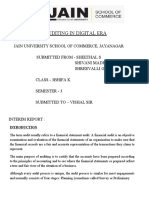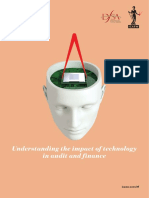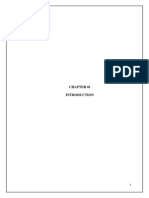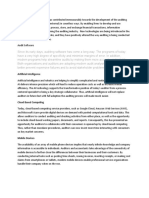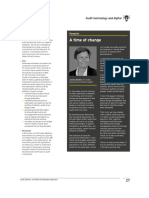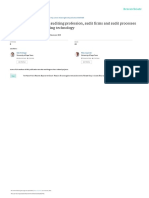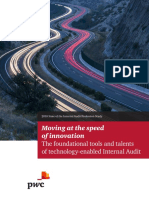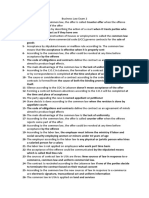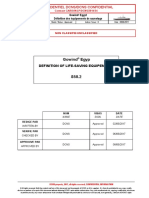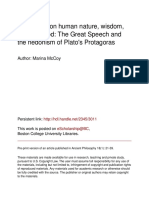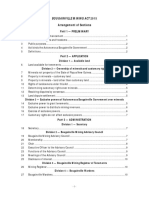AUDITING AND CORPORATE
GOVERNANCE
INDIVIDUAL ASSIGNMENT
BY
SREELAKSHMI GOPI
�New Trends in Auditing
• Increased Use of Artificial Intelligence and Automation
One of the most significant trends that will shape the future of auditing
is the increased use of artificial intelligence (AI) and automation. This
will allow auditors to process larger volumes of data more efficiently
and accurately, while also identifying potential risks and opportunities
more quickly. Today, internal audit trends are advancing quickly and the
internal audit team has a lot more to evaluate and process to lessen
any business risk. As the stakes rise, teams will need to depend on
technology to improve data accuracy to be successful.
�The Rise of ESG Reporting
• Environmental, social, and governance (ESG) issues are becoming
increasingly important to businesses and their stakeholders. As a
result, companies are under pressure to report on their ESG
performance, and auditors will play a key role in ensuring the
accuracy and reliability of these disclosures. Auditors will need to
have a deep understanding of ESG issues and be able to assess their
impact on a company's financial performance and risks.
• Investors are particularly interested in ESG reports because they
can help them better manage investment risks and understand a
company's long-term strategy to value creation. In fact, research
reveals that investors value consistent and mandated standards more
than finance experts do as preparers.
�Cloud-Based Audit Tools
• The use of cloud-based systems for audit purposes is becoming more
common, enabling remote working, and increasing efficiency. Also,
since everyone is utilizing the same technology, the arrangement of
data and files will likewise remain uniform, making the process more
effective and uncomplicated. However, this also requires auditors to
have a deep understanding of data privacy and security and to take
steps to ensure that client data is protected.
�Blockchain Technology
• Blockchain technology is emerging as a powerful tool for auditing,
particularly in areas such as supply chain management and financial
transactions. The handling and recording of financial transactions will
be completely changed by blockchain technology, and auditors are
essential to making sure that blockchain-based systems work securely
and effectively.
�Big Data Analytics: The Future of Auditing
• The increasing availability of data is transforming the auditing
profession, enabling auditors to identify potential risks and
opportunities more quickly and accurately. Big data analytics can help
auditors to analyze large volumes of data and identify trends and
patterns that may not be immediately apparent. This can also help
auditors to provide more insightful and value-added services to their
clients, and to identify potential fraud and other irregularities.
�Changing Business Models
• The future of the auditing profession is likely to experience significant
changes in its business models. This may include a move towards
more advisory and consulting services, as well as greater use of
technology tools and techniques. Auditors will need to adapt to these
changes and develop new skills and expertise to remain competitive
in the market.
�Growing Importance of Ethics and
Professional Standards
• Ethics and professional standards are becoming increasingly
important to stakeholders in the auditing profession, particularly
considering recent audit failures and scandals. Auditors will need to
be able to demonstrate that they are acting in the best interests of
their clients and that they are upholding the highest standards of
professional conduct. This will require a focus on ethical decision-
making and a commitment to ongoing professional development and
training.
�Growing Internal Audit Talent Gap
• Internal audit teams' way of conducting their job is being influenced
by staff shortages, changing work attitudes, and a skills gap that
already exists. Several teams have reported that they are having
trouble finding talent to replace those that leave. Expectations are
rising for the team's existing members in the meanwhile. They must
be engaged because they want to do more. The existing staff must be
encouraged and provided with possibilities to work in fields of
interest such as cybersecurity, sustainability, and others.
�Never-ending Evidence Gathering
• Manual, repetitive tasks associated with evidence collection can
significantly slow down the audit process. These tasks typically
involve collecting and verifying large amounts of financial data, such
as invoices, bank statements, and other financial documents. When
auditors must perform these tasks manually, it can take a significant
amount of time and resources to check each bank or financial
statement against other documents to ensure that they are accurate
and complete.



